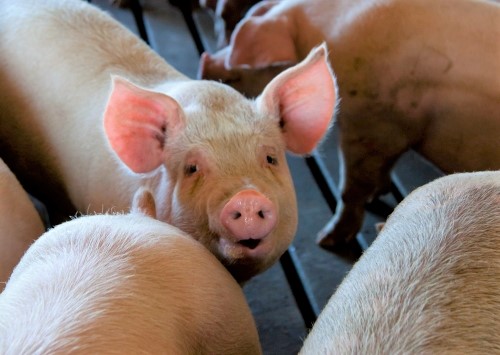Prevent.
Observe.
Report.
Keep up.
 African swine fever (ASF) is a highly contagious viral disease of swine with severe economic consequences. It has not been detected in the U.S., does not transfer from swine to humans, and does not affect humans. Affected pork is safe for human consumption.
African swine fever (ASF) is a highly contagious viral disease of swine with severe economic consequences. It has not been detected in the U.S., does not transfer from swine to humans, and does not affect humans. Affected pork is safe for human consumption.
To protect the U.S. pork supply from a foreign animal disease outbreak, DATCP advises swine owners and veterinarians to defend against ASF (and many other diseases) by focusing on the following key areas:
-
Prevent: ASF from entering your farm by following sound biosecurity practices.
-
Observe: your animals regularly for any clinical signs of ASF.
-
Report: suspected cases of disease to your veterinarian immediately.
-
Keep up: with ASF information and be ready to adapt to changing conditions.
Industry also recommends that producers know where their feed is coming from to prevent exposing their herd to feed that could be contaminated with ASF or other diseases.
Basic information about ASF is available through the following fact sheets:
Biosecurity Practices
The basics of biosecurity include:
- Controlling who has access to your animals and farm
- Wearing protective clothing and footwear (farm staff and visitors)
- Cleaning and disinfecting your premises
- Isolating new or sick animals from your herd for at least 21 days
- Testing to know the health status of your herd
More information about biosecurity practices are available through the following resources:
Clinical Signs of ASF
- High fever
- Moderate loss of appetite
- Abnormal redness of the skin or mucous membranes (erythema); bluish or purplish discoloration of skin (cyanosis)
- Recumbency (leaning, resting, reclining)
- Bloody diarrhea
- Miscarriages
| - Death
- Multi-focal erythema
- Ears, abdomen
- Raised or necrotic areas
- Intermittent, low fever
- Coughing
- Painless joint swelling
- Loose skin from becoming thin (emaciation, stunting)
|
If you suspect any foreign animal disease of swine, report it immediately to your veterinarian who will make a medical determination. For more information about the disease, view the Center for Food Security and Public Health technical fact sheet.
Reporting Suspected Diseases
If a veterinarian suspects ASF, state law requires that they report the finding to DATCP within one day. More information about reporting requirements and how to report a disease are on DATCP’s disease reporting requirements webpage.
Diagnosis
The only way to confirm ASF is by taking a sample and submitting it for testing. Certain labs in the U.S. are qualified to test for this disease. Samples can only be collected by approved state or federal staff.
Treatment
There is no treatment for ASF. If diagnosed on a premises, the animal and any other swine it was in contact with must be euthanized to prevent the spread of the disease.